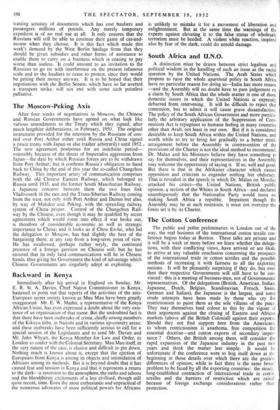South Africa and U.N.O.
A distinction niust be drawn between strict legalism and political wisdoni in the handling of such an issue as the racial question by the United Nations. The Arab States which propose to raise the whole apartheid policy in South Africa have no particular reason for doing so—India has more reason —and the Assembly will no doubt have to pass judgement on a claim by South Africa that the whole matter is one of those domestic issues in which the United Nations is expressly debarred from intervening. It will be difficult to reject that contention, but to admit it will cause grave dissatisfaction, The policy of the South African Government and more particu- larly the arbitrary application of the Suppression of Com- munism Act is repugnant to humane feeling in many countries other than Arab; not least in our own. But if it is considered desirable to keep South Africa within the United Nations, and worth while to try to bring her gradually to a better mind, arraignment before—the Assembly in contravention of the provisions of the Charter is not the ideal method to recommend. Dr. Malan and his Ministers believe they have something to say for themselves, and their representatives in the Assembly may welcome the opportunity of saying it. If so, well and good. But there is that in the Afrikaner character which causes opposition and criticism to engender nothing but, obduracy. th That is revealed in the speech in which Dr. Malan on Monday attacked his critics—the United Nations, British public opinion, a section of the Whites in South Africa—and declared unambiguously that the Nationalist Party would insist on making South Africa a republic. Impatient though the Assembly may be at such restraints, it must not overstep the limits set it by its Charter.


































 Previous page
Previous page